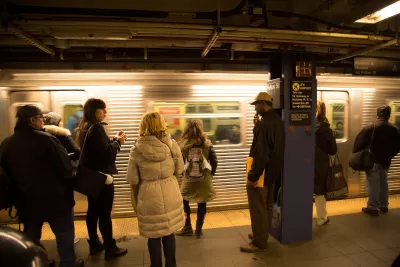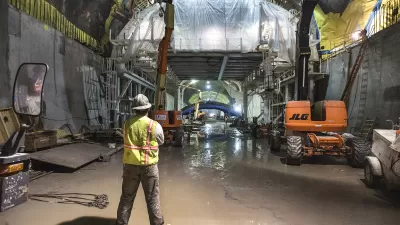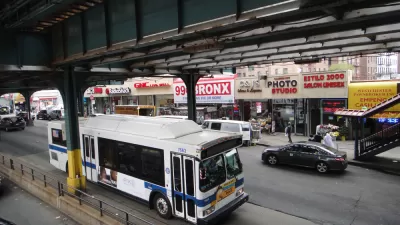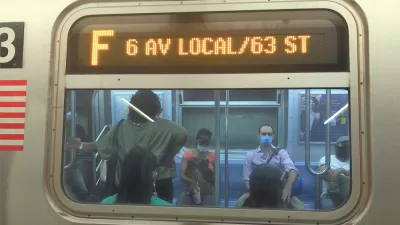With some of the highest per-mile costs in the world, the state wants more accountability for New York City's transit spending.

Clayton Guse reports that New York's Metropolitan Transportation Authority (MTA) is late on delivering a state-mandated report that compares its operating expenses with those of transit agencies in similar international cities.
Last year, after a Marron Institute study found that "MTA spends significantly more per mile of new subway track than any other transit agency on the planet," state legislators implemented a law requiring the MTA to provide a comparison with other modern transit systems in major international cities. The rule is "meant to encourage transit leaders to make sure they are properly spending the public’s money" by assessing how their daily operating expenses compare to "national and international peer cities."
After delaying the report for a year last January, the MTA missed the January 2021 deadline for submitting the report as well. State Senator Leroy Comrie (D-Queens) admonished the agency, stating "laws are not passed to be treated as suggestions." Given the MTA's massive expenditures and "immense strain" caused by the pandemic, monitoring operational efficiencies is "more important than ever," says Colin Wright, an advocacy associate with TransitCenter.
The MTA says it is "in the process of finalizing the report" and that it expects to cut $601 million in costs during 2021, though a spokesperson did not provide details on how the cost savings will be achieved.
FULL STORY: MTA ignores state mandate to compare sky-high costs with expenses of transit systems in other countries

Alabama: Trump Terminates Settlements for Black Communities Harmed By Raw Sewage
Trump deemed the landmark civil rights agreement “illegal DEI and environmental justice policy.”

Study: Maui’s Plan to Convert Vacation Rentals to Long-Term Housing Could Cause Nearly $1 Billion Economic Loss
The plan would reduce visitor accommodation by 25% resulting in 1,900 jobs lost.

Planetizen Federal Action Tracker
A weekly monitor of how Trump’s orders and actions are impacting planners and planning in America.

Waymo Gets Permission to Map SF’s Market Street
If allowed to operate on the traffic-restricted street, Waymo’s autonomous taxis would have a leg up over ride-hailing competitors — and counter the city’s efforts to grow bike and pedestrian on the thoroughfare.

Parklet Symposium Highlights the Success of Shared Spaces
Parklets got a boost during the Covid-19 pandemic, when the concept was translated to outdoor dining programs that offered restaurants a lifeline during the shutdown.

Federal Homelessness Agency Places Entire Staff on Leave
The U.S. Interagency Council on Homelessness is the only federal agency dedicated to preventing and ending homelessness.
Urban Design for Planners 1: Software Tools
This six-course series explores essential urban design concepts using open source software and equips planners with the tools they need to participate fully in the urban design process.
Planning for Universal Design
Learn the tools for implementing Universal Design in planning regulations.
Caltrans
Smith Gee Studio
Institute for Housing and Urban Development Studies (IHS)
City of Grandview
Harvard GSD Executive Education
Toledo-Lucas County Plan Commissions
Salt Lake City
NYU Wagner Graduate School of Public Service





























